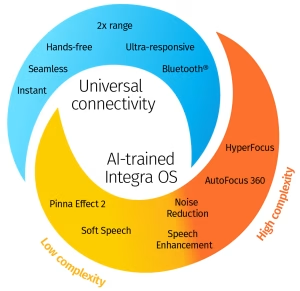

Bio Med Central. Published April 19, 2022
Ye, X., Zhu, D., Chen, S., Shi, X., Gong, R., Wang, J., Zuo, H. and He, P.
For decades, modern medicine has been reactive; treating illnesses as they occur. Though Preventive Medicine has been a recognized specialty since 1954, the US health system could do more. Multiple studies have shown that preventing illness is better than treating illness; clearly better for the patient, and less expensive as well.
The World Health Organization (WHO) reported that 466 million people suffered from moderate or above hearing loss globally in 2020. The risk of hearing loss increases with age. The WHO estimates that more than 33% of adults over 65 suffer from hearing loss. A 2015 study in several provinces of China found that 55.31% of adults over age of 60 have hearing loss. With the aging of the population here in the United States and abroad, this problem will only grow. The 2015 Global Burden of Disease study further revealed that hearing loss has become the second chronic disease threatening human health, bringing a heavy social and economic burden.
Hearing aid use is generally considered to improve hearing-related quality of life measured by the Hearing Handicap Inventory for the Elderly (HHIE), while there are debates about whether hearing aid use improves the general quality of life. The results on the effects of hearing aids on broader health outcomes such as mental health, physical health, cognitive function, and social engagement are also inconsistent. Some studies show no significant improvement in mental health, or cognitive function, while others believed that hearing aids users had a significant decline in the perception of loneliness, improved social skills, and better general health.
Due to the concealed nature of hearing loss among older adults, many do not pay any attention to it. In fact, in a study we just reviewed, the authors found that 42 % of the people in the study didn’t think they had hearing loss and they did (C. Watson, Science Alert Health Nov 7, 2022).
In that 2015 study of several provinces in China, only about 6.5% of older adults with hearing loss used aids. In view of the benefits and low prevalence of use, the health effects of hearing aids may be more pronounced. This study explores the effects of hearing aid rehabilitation intervention on quality of life and other health outcomes in rural China by providing free hearing aids for middle-aged and older adults with hearing loss.
Of the total sample (385 people) almost 29.61% had moderate hearing loss, 37.40% had a severe loss and 32.99% had a profound loss. Those in the treatment group (150 people) were prescribed hearing aids and real ear measures were given to ensure that the aids met the needs of the patients. Those in the control group (235 people) received no interventions. At the 12-month mark, hearing aid adjustment, repair, and re-instruction in the use of hearing aids were provided free of charge to all in the treatment group. A follow-up survey was conducted 20 months after the baseline. A total of 350 samples were followed, and their quality of life, physical function, mental health, cognition, and healthcare utilization were tracked.
The intervention also alleviated the increase in depressive symptoms in the 20-month follow-up. For adults with no social activities or with restricted social networks, the hearing aid intervention did not improve their health. For adults with at least one social activity, the hearing intervention significantly improved the quality of life in emotional and situational dimensions. For adults with active social networks, the hearing aid intervention not only improved their quality of life but also significantly alleviated the increase in depressive symptoms.
To be clear, this study proves that providing (free) hearing aids substantially improved social-related quality of life and alleviated depressive symptoms. It is imperative that middle and older adults with age-related hearing loss wear hearing aids regularly, as well as strengthen their social participation and social networks. The intervention is expected to be scaled up through its integration with the health insurance system in China and be adapted to other similar settings in developing countries facing the problem of untreated hearing loss.
One wonders what would happen if “free” hearing aids could be distributed to all Americans with moderate or above hearing loss. That cost-benefit analysis would be worth the read; don’t you think? If you have questions about this study, or you would like to read the study for yourself, please contact us in Minnesota.
Some other notes to comment on this study are the training and prescriptions of amplification on the adults in the study. We don’t believe it best practice to fit everyone with one brand of hearing aid. And how do we know if the hearing aids they fit were of good sound quality to make the summary of not helping those without social interactions. They also commented that they intervened at 12 months. We find that when people get hearing aids they need a lot of care the first three months as they get used to hearing better. In general, we believe this study had some good points but also some confounds.
Signia Pure Charge&Go BCT IX hearing aids provide seamless Bluetooth Classic connectivity, superior sound processing, and all-day battery life. Designed for comfort and performance, these small, rechargeable RIC hearing aids offer hands-free calls, music streaming, and advanced speech clarity. Key features include:
The case sits behind the ear with a hook over the top of the ear. For all types of hearing loss from mild to moderately severe and up to profound. Hearing aids behind the ear are the perfect choice if you want extra power in a stylish design.
Powered By SinglerDesign.com